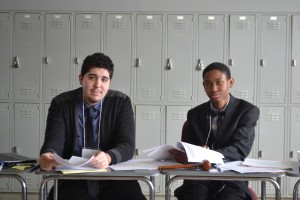 This article kicks off a new monthly series, Delegate to Dais, where we’ll talk about how to start your own MUN conference. This series is written by Chris Talamo, Board Chair of Education in Motion (EIM). Chris is a former DG of NHSMUN and has helped high schools start local MUN conferences across the US.
This article kicks off a new monthly series, Delegate to Dais, where we’ll talk about how to start your own MUN conference. This series is written by Chris Talamo, Board Chair of Education in Motion (EIM). Chris is a former DG of NHSMUN and has helped high schools start local MUN conferences across the US.
If you have never run one before, starting a MUN conference can seem like an enormous undertaking. The concerns I’ve heard from faculty advisors include wondering if their students are talented enough, if they will be able to raise the necessary funds, and even whether they need to turn their MUN club into a class first! Well I’m here to tell you that you can start and run a MUN conference. It’s not something you’ll be able to plan in one weekend, but with the right partnerships and support, even a young program with only a few years of MUN under their belt can pull it off!
But first, let’s address why a school would start a MUN conference. A new conference can give a new sense of life and purpose to a MUN program that is eager for a new challenge. The conference’s leadership structure can also create a clear leadership pipeline for students, so that incoming freshman are inspired to become the Secretary-General of their conference when they are seniors. It also helps students stand out on their resumes or college applications – my role leading my high school’s MUN conference was a major component of my college application and helped me get into my top choice college.
So what do you actually need to start a MUN conference? In short, it boils down to hard work and the right partnerships.
Hard Work – Your Program’s Time, Dedication, and Energy
Any startup conference needs a talented group of students to lead it. The first year of a conference is almost always the hardest because the conference leadership needs to invent new systems for the conference rather than just repeat them. Therefore, your MUN club needs to have students who just can’t seem to get enough MUN. The students to look for are the ones who come back from long conferences energized and passionate about MUN rather than exhausted. Starting a conference requires initiative, grit, and a lot of extra work from students, but a successful conference rewards that hard work in countless ways.
Partnerships – Your School
Besides your own hard work, you also need other people to believe in your conference before it can be successful. The first place to look is your school’s administration. They will be critical for reserving committee rooms and access to technology ranging from copy machines to digital projectors and Smart Boards. Conferences also cost money to set up, your administration can help front some of the money needed to buy gavels, delegate meals, and other materials to make your conference work. Finally and most importantly, your school may have regulations on hosting students from other schools and collecting fees, so making them aware of what you’re planning early will prevent any conference-ending administrative issues later on.
Partnerships – Local Faculty Advisors (FAs)
Once the components at your school are in place, the single most important partners for your conference are the FAs at the schools you’re going to invite to your conference. In most cases, it’s those FAs who will be deciding whether or not their students will attend your conference. Our work shows that conferences tend to start breaking even at around 75-100 delegates, so new conferences should try to get loose verbal commitments for at least that many delegates before putting any money down.
Beyond just being customers, FAs can play a valuable role as thought partners. The FAs in your area know their own conference calendars, and can make suggestions on key decisions such as when the conference could be held or what kind of delegates it should serve (e.g. new vs. experienced). The objective of your conference should be to provide a valuable, educational experience for the delegates, so who better to help develop that than the FAs sponsoring them?
Partnerships – Other Organizations
Finally, partners from the MUN community can support your work and make your job a lot easier. Education in Motion partners with high school MUN clubs to help them start their own conferences by providing the required initial funding as well as a MUN veteran to guide students through the process of executing a conference. We’re in the process of building a library of resources detailing the various steps required to plan and execute a conference. Regular readers of Best Delegate can also find posts from partners in the US State Department and other organizations that are willing to lend their support and even guest speakers. Local university MUN teams may also be willing to provide your conference staff with dais training or other support (and this is a great way to network with colleges for your own application process!). MUN has developed into a broad and supportive community full of organizations eager to help, and it never hurts to ask!
With these components in place – a hard working student body and strong partnerships with your school, neighboring FAs, and local organizations – you’ll have everything you need to run a successful conference. Beyond that, it’s the mechanics of how a conference trains and manages its staff that makes a conference go from good to great. Check back next month for a first look at some of those mechanics: topic selection!

